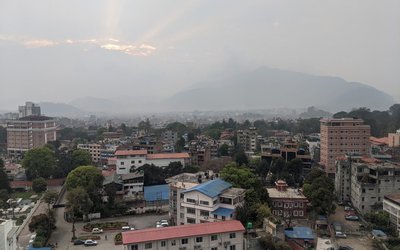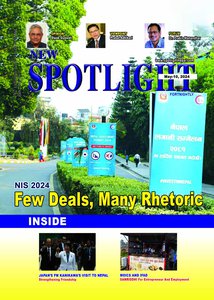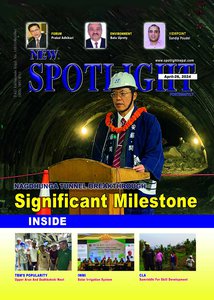
When Richard Howard, PhD, the Country Director of the International Labour Organization Nepal, arrived in Kathmandu to take up his assignment in August 2016, he had brought 20 years of management and research experience of working in the private sector and non-government organizations, including the ILO, in Asia and the Pacific region. His expertise has included gender equality and non-discrimination, migration, indigenous peoples, sexual and reproductive health and HIV and AIDS. Howard worked in the ILO as Senior Regional Specialist on HIV and Decent Work for Marginalized Groups in Bangkok, Thailand (2010 – 2016); Chief Technical Advisor, Private Sector Partnerships on Health for Internal Migrants in Beijing, China (2006 – 2010); FHI360 as Asia Regional Program Manager, Private Sector Partnerships for Health in Jakarta, Indonesia (2002-2006); and Castle Asia, as Director of Research (Industry Analysis and Market Strategies) in Jakarta, Indonesia (1996 – 2002). A Fulbright scholar, Howard worked in Indonesia with research focusing on gender, ethnicity and national identity (1993-95). An American citizen, Howard holds a Doctorate of Philosophy in Anthropology from the University Illinois (1996) and a Bachelor of Arts degree from University of South Carolina (1987). Howard spoke to New Spotlight on various issues.
The International Labor Organization has been supporting Nepal for the last five decades on labor issues, how do you assess Nepal's labor issues now?
The state of labour issues has come a long way in Nepal during the 50 years in which ILO has worked here. We can see that the three major constituents, which comprise the government and organizations of employers and workers, have developed a significant capacity to manage industrial relations in a productive way. Some key achievements in these years include a legal framework that is in line with international labour standards, significant reduction in child labour and forced labour practices, and a national labour migration strategy that is sensitive to the need for protection at all stages of the migration process.
While this general framework for effective labour relations in the country is in place, much work needs to be done to support the implementation that reaches the grass roots level. Job creation is a major priority of the government but there is still a severe lack of new jobs in the country. Under the new constitution, ILO is tasked with supporting its partners in Nepal to build their capacity at local levels so that policies can be more effectively implemented under the guidance of local governments.
Nepal is a signatory to various work related conventions in guaranteeing conducive working environment for workers. What do you say about the situation now?
Nepal has ratified eleven of the 189 ILO Conventions and seven of these identified as fundamental. Fundamental conventions cover areas that each of the 188 ILO member states are expected to implement, regardless of whether they are ratified or not. These include conventions on freedom of association, collective bargaining, forced labour, child labour and non-discrimination. Of the fundamental conventions, ILO is yet to ratify Convention 87 on Freedom of Association, although this right is already covered in Nepal’s constitution.
What are the challenges?
The major challenge now is to support implementation in the new federalist structure of Nepal. Industrial relations and responses on trafficking and migration, forced and child labour, will be much more effective when ILO constituents have the capacity and the resources to monitor and respond to issues at the local level. Currently, many processes are overly centralized, which leads to poor results for workers at the factory level. The decentralization process needs to bring services closer to the local level.
What is your impression about occupational safety and health in workplaces?
The status of occupational safety and health (OSH) in workplaces is poor. One just needs to look at construction sites or transportation networks to see the risks that workers are subject to on a daily basis. OSH is not an expensive endeavor. It requires leadership, monitoring, and a cultural change at the workplace level. The Ministry of Labour and Employment (MOLE) has recently developed a national policy on OSH that is in line with ILO conventions. Now it is time to drive implementation at the workplace level. Clearly priorities should be placed on industries with the greatest risk.
There is an impression in Nepal that ILO is just for the protection of working class and their rights. How do you look at this?
ILO by its very nature is tasked with creating a space for dialogue and negotiation between employers, workers and the government. There needs to be an effective balance between the three parties to ensure that companies prosper and grow and deliver new jobs. Trade Unions play an important role to make sure that workers receive a fair deal and that their fundamental rights to fair wages, safe working conditions and social security are met. Meanwhile governments are tasked with making sure that all parties in the process are in compliance with labour standards and national policy. This supports efforts to drive growth that is inclusive and beneficial to society at large. If ILO veers its support in favor of one party over another, the results will certainly be poor industrial relations, increases in labour strikes and further decay in economic growth and job creation.
Nepal is implementing many conventions. However, there is still a big controversy on ILO convention 169. Does it talk about political rights as well?
It is important that ILO revisit the implementation of convention 169 in Nepal. The controversy around the implementation of 169 is because implementation appears to have veered away from the framework and original intention of the convention. Implementation of the convention in the past became interlinked with domestic political considerations and debates. It is now pertinent for ILO to take steps to reshape the implementation of the convention in Nepal, to bring it back to the original intention of the convention in order to best serve the needs of indigenous peoples.
Besides working with trade unions, employers and the government, what are the other areas in which ILO has been working in Nepal?
ILO is working with the World Bank and the Department of Local Infrastructure and Agricultural Roads (DoLIDAR) to support job creation through labour intensive road maintenance projects in 36 districts. The project has created thousands of jobs for the poorest and most marginalized communities in Nepal. There have been some important fundamental results with this work, including an emerging appreciation of the importance of maintaining local roads to support year round access and economic growth in these areas. On top of our usual constituents, we are working with the Danish Government and the Ministry of Agriculture to support a large number of business and commodity associations, NGOs and media houses to promote value chains in orthodox tea, ginger, large cardamom and dairy in the seven eastern hilly districts.
As Nepal is in the process of amending the Labor Act, how is ILO supporting it?
After a near ten-year process, Nepal is close to passing a revised labour law and a new social security act. These two laws reflect a very elegant and pragmatic agreement between employers and workers in the country. The agreement basically allows for more flexible hiring and firing practices by businesses in exchange for better social protection for workers, including unemployment insurance, maternity benefits and pensions. Health benefits will be covered under a separate initiative under the Ministry of Health. In the past, businesses were reluctant to create new jobs due to the high costs of downsizing. Once these laws area passed and implemented, this constraint to economic growth will be adequately addressed.
It is said that foreign investors are afraid to invest in Nepal due to over-protective labor act. How do you look at this?
This may have been the case in the past but the future looks promising for Nepal. The new Industrial Enterprise Act-2073 (2017), and upcoming new Labour Law Act and Social Security Act will support increased investment in Nepal. As a caveat, it needs to be noted that there are many challenges to investment in Nepal including unstable government, infrastructure and complex business laws that hamper both foreign and domestic investment. These issues must be addressed in parallel with these efforts on labour relations.
As large numbers of Nepalese are leaving for foreign employment, how can ILO support to protect the rights of Nepalese labor abroad? Are Nepalese laborers safe?
An estimated 1400 Nepalese leave the country daily, not counting those who migrate through undocumented channels. The remittances they send home make up almost one-third of Nepal’s gross domestic product.
While labour migration generates substantial benefits for Nepal in terms of employment and remittances and human resources for countries of destination, challenges such as abuses during recruitment and employment are quite common and have been well documented.
What plan does ILO have now?
On a pilot basis, ILO has aimed to establish a fair recruitment corridor between Nepal and Jordon focusing on the garment sector to prevent deceptive and coercive recruitment practices. The ILO calls on serious and concerted efforts in both sending and destination countries to work in line with the international labour standards that uphold the safety and dignity of workers.
How do you view the problem of human trafficking in Nepal and how is ILO supporting efforts to handle it?
The US Department of State reports Nepal is a source, transit, and destination country for men, women and children subjected to forced labour and human trafficking that calls for a multi-pronged approach to address this deepening crisis. The ILO, through Work in Freedom (WIF) project aims to prevent the trafficking of women and girls from South Asia by ensuring decent work conditions in destination countries in the Middle East, providing regular remittances for migrant workers, reducing migration costs, enhancing the knowledge, skills and employability of migrant women and improving education for girls. Through its programmes and projects it brings together its social partners and their stakeholders to uphold ILO labour standards and fight against all forms of discriminations and exploitations of workers.
Despite the abolition of bonded labor, child labor and human exploitation continue. How do you suggest ending exploitation?
The ILO in Nepal has made a dent against bonded labour and child labour through its International Programme on the Elimination of Child Labour (ILO/IPEC) which prompted the Government of Nepal to ratify ILO Convention on Minimum Age Convention, (No 138), the ILO Convention on the Worst Forms of Child Labour (No 182) and the ILO Convention on Forced Labour (No. 29). Similarly a project on Sustainable Elimination of Child Bonded Labour in Nepal targeted the freedom of Kamaiya (bonded labourers) in agriculture. Much of the awareness and advocacy for the elimination of child labour in all forms has come through the work of the ILO with its constituents and like-minded actors.
How do you see the state of child labor?
Asia and the Pacific has the largest number of children in child labour (almost 78 million or 9.3% of child population) and calls for increased measures to end this problem. The ILO in Nepal is building on its past work and engaging the government and its social partners, private sector organizations, civil society organizations and the media to work together to end child labour in all its forms with zero tolerance.
As Nepal ILO marked fifty years of establishment of relations and a high level ILO delegation visited Nepal, how do you see the prospects of Nepal-ILO relations in the future?
Over the last 50 years, we have worked together to build and strengthen the institutions for promoting decent work in Nepal, including the creation of a strong and impressive organization of employers- the Federation of Nepalese Chambers of Commerce and Industry, and a group of highly committed and well-coordinated workers ‘organizations, which have joined hands under the Joint Trade Union Coordination Centre. The Ministry of Labour and Employment has made great strides in building a policy framework based on international labour standards and best practices.
We have made progress in creating more and better jobs to support a lasting peace in Nepal. We have pioneered labour intensive approaches to infrastructure development that have increased food security and delivered quality jobs to those who need them the most.
We have made progress in promoting equality and non-discrimination for all workers, and we have paid special attention to the challenges faced by women, people from rural and highland areas, those from so-called lower castes, and ethnic and indigenous peoples.
We have also laid the foundation for a social protection floor that is fundamental to ensuring that all women and men reap the benefits of development and contribute to productive growth and national solidarity. Since Nepal needs an economic leap, ILO will continue to provide its technical assistance to the government, the employers and trade union organizations and other stakeholders to create an enabling environment for social dialogue, industrial relations, and entrepreneurship development.
- NIS 2024: Few Deals, Many Rhetoric
- May 12, 2024
- LATE SAMBHU PRASAD GYAWALI: Legendry Lawyer
- May 03, 2024
- TBM’S POPULARITY: Upper Arun And Dudhkohshi Next
- May 02, 2024
- QATAR AMIR’S STATE VISIT: Five Agreements
- Apr 28, 2024
- BIPIN JOSHI: Call For Release
- Apr 21, 2024
















